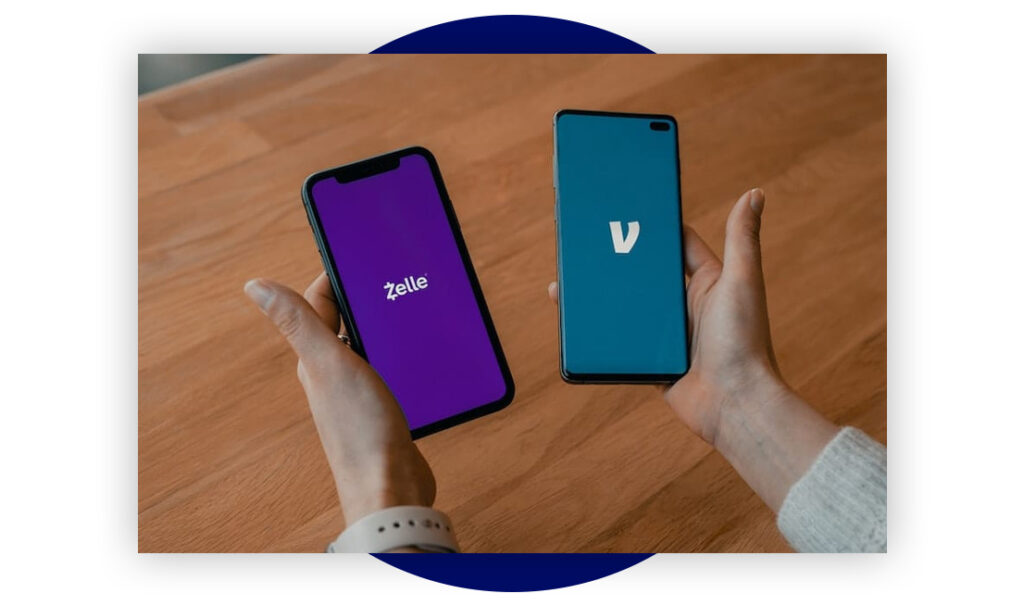Why Some Payment Methods Might Cost You (and Your Customers)
The peer-to-peer(P2P) transactions space is on fire with services like Venmo and Zelle leading the storm. Undoubtedly, the Covid-19 pandemic is behind much of this growth. According to Allied Market Research, over $1.8 billion dollars was generated by the global P2P payment market. A P2P payment transaction occurs when two people complete an exchange of funds from their bank and use the internet to complete the process.
As a small business owner, you’re probably considering adding these payment methods. After all, you use it personally and know that it’s a convenient and easy-to-use payment tool. Below the surface, however, these P2P transactions can actually cost you and your customers. So before you implement Stripe and others to your business, consider the following potential consequences discussed here.
New Tax Implications for Small Business Owners

Previously, businesses were required to report income to the IRS for higher thresholds:
- $20,000 or more in payments
- 200 or more transactions using a payment service
Changes go into effect for 2022 for businesses that accept payments through an app like PayPal, Venmo, or Square. The IRS has announced that these digital payment apps must report on a person’s business transactions. Each payment app must provide a Form 1099-K to any business that receives $600 per year in goods or services.
If you receive less than $600, you’re still required to report that income. This law affects LLCs, partnerships, and freelancers.
Costs of Taking P2P Transactions
One of the reasons that you might be considering accepting P2P transactions is to avoid credit card transaction fees. But Venmo and others have transaction fees that you must pay on the business side.
Venmo is actually owned by PayPal and its transactions are processed through its parent company or Braintree (another of PayPal’s businesses). You pay 1.9% plus $0.10 for every payment that’s above $1.
For example, if a customer pays you $100 for a product or service through Venmo, you will actually receive $98 after the processing fees. These fees are non-refundable too.
If your customer decides to use their credit card to pay for their purchase through a P2P payment, you’re going to get hit with transaction fees. For example, a flat 3% fee for credit card transactions is charged on Venmo for payments.
Cash App, which is owned by Square, is a P2P that allows consumers to use cash to pay for things. When you sign up for a “Cash for Business Account” which allows you to make transactions for goods and services, you are charged a transaction fee. Cash App for business also has its own Terms of Use which outline how you must deal with costly issues like chargebacks.
Security and Fraud Concerns
While P2P payments are secure, they’re still a hotbed for fraudulent activity and security concerns. There are many cases of Venmo users who have had their funds vanish without an explanation for instance.
“I didn’t know that you can’t get your payment back,” said Angela Kincaid who spoke about her story of trying to purchase a puppy using a P2P payment.
P2P payments simply don’t offer the type of protection that businesses and consumers are used to with credit cards. These P2P payment apps were not designed for businesses and other small business payment options are better developed for business use.
Your Funds Will Take Time to Arrive
P2P transactions could take one to three business days before you have access to the money. Do you want immediate access to that money in your business bank account?
You’ll need to pay more to do that. 1% (maximum of $10) is taken out for these “instant transfers” from services like Venmo, Apple Pay, and PayPal. The instant transfer can take anywhere from immediately to 30 minutes to happen.
If you’re moving thousands of dollars at a time, that 1% might not hurt as much. But it’s not worth it with smaller transactions.
To avoid the fees, you will need to wait out the period indicated by the P2P service. Here are some of those waiting periods you might be susceptible to:
- Apple Pay – One to three business days
- Venmo – One to three business days
- Stripe – One to five business days
Additionally, some P2P payment services have limits and other restrictions. For example, you can only transfer up to $10,000 per transfer and up to $20,000 within a seven-day period with Apple Cash.
Platforms that are built for businesses to accept payments may offer access to funds faster. For example, Finli can settle a transaction the next business day after receiving funds.
Venmo, Stripe, Zelle, oh My!
Peer-to-peer payment apps are growing in popularity every year, as they provide an easy and fast option to send payments from one person to another. According to the NAFCU, over 70% of US adults used at least one P-P app in 2020 and transaction volume grew by 37% in 2021. Big names like Zelle, Venmo, and Stripe make digital payments a breeze.
The big downside is that most of these P2P payment platforms were not created for business transactions and using them might cause unforeseen costs.
Here are the main pros and cons of using Zelle, Venmo, and Stripe, plus the benefits of switching to Finli, as a payment management system created specifically for small businesses. To save your business money and time, look into services that offer what your business needs and will be able to grow with you.
Pros of Using Zelle
- Zelle® is considered by many businesses as a PayPal option with no fees. Instead of losing 3.5% and upwards in transaction fees, using Zelle saves money in the long run.
- As most US-based banks provide access to Zelle payments, it’s a widely used payment provider.
- No need for the recipient’s bank details. Just an email or phone number will suffice.
- Quick (sometimes instant) payments. No need to wait for days for a payment to clear.
Cons of Using Zelle
- There’s no fraud protection, only send money to verified Zelle accounts and double-check each transaction
- Payment size limits make using Zelle a pain for small businesses.
- Zelle is available ONLY in the US, so, if you need to manage payments with international business partners, you will need to find an alternative.
Pros of Using Venmo
- Quick and convenient for personal transactions. Now owned by PayPal, Venmo is a P2P payment processor designed to send money to friends.
- Free to send money from a bank account or debit card;
- Users can get a debit card and a credit card.
Cons of Using Venmo
- Payments are public by default, so you need to set them for friends only to see.
- It was not designed to be used for business transactions. While you use it to pay certain businesses, Venmo is not a proper small business payment management system.
- While it’s getting popular across the US, it’s also preferred by scammers. Be aware.
Find out more about why you shouldn’t use Venmo for business.
Pros of Using Stripe
- Can be used for international transactions as well
- Many accepted payment methods (debit cards, credit cards, ACH, digital wallets etc.)
- Flat-rate pricing, no setup, cancellation, or monthly fees.
Cons of Using Stripe
- You pay for ALL transactions plus monthly fees.
- Difficult to implement, if you don’t have the expertise.
- Not suitable for small in-person businesses.
Can I Send Money through Stripe?
Yes, but Stripe is a more expensive P2P payment processor, as they charge transaction fees for payment option. Did you know that Finli has NO ACH transaction fees? Not to mention our easy to use, intuitive dashboard.
If you are a small business, interested in creating professional invoices, managing payments and getting paid on time, Finli is your best bet.
Takeaways
Peer-to-peer platforms like Zelle and Venmo are great tools for personal transactions. The popularity and familiarity with using these payment solutions are why some businesses may use them for their payments initially. However, their offerings aren’t built for business payments, and accepting them could cause unforeseen costs. To save your business money and time, look into services that offer what your business needs and will be able to grow with you.
Need help getting started? Finli was founded to help small businesses instantly invoice, collect immediate payments, and more seamlessly handle their accounts receivable. Sign up here!




